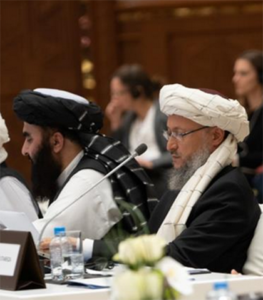Analysis: Is peace in Afghanistan still a dream?
After months of delay in the commencement of peace talks between the Government of Afghanistan and the Taliban, finally the delegations from both sides sat together in Doha on September 12.
But after the preliminary direct talks between the two parties, there are two conditions insisted on by the Taliban that have sent the process into deadlock.
 The first of the Taliban’s demands is to make the Sunni Hanafi school of thought the legal basis of the peace talks. The Taliban believe that Islam’s two conflicting sects – the Shia and the Sunni – can’t be accommodated under one set of laws.
The first of the Taliban’s demands is to make the Sunni Hanafi school of thought the legal basis of the peace talks. The Taliban believe that Islam’s two conflicting sects – the Shia and the Sunni – can’t be accommodated under one set of laws.
As context, it is worth remembering that religious minorities, especially the predominantly Shia Muslim Hazaras, suffered persecution and violence under Taliban rule in late 1990s.
The Taliban also insist that the deal they signed with the US in February this year be the basis of the negotiations. But the current Afghan Government wasn’t a party in that deal.
And effectively, the deal only agreed: the safe exit of the US from Afghanistan; that the Taliban will cut its ties with terrorist groups such as Al-Qaida and will not let the country to be used for any terrorist activities or plotting against the US and its allies. There was no agreement on the preservation of democracy or human rights.
The US has announced its withdrawal from Afghanistan will be completed by mid-2021 and this seems to be firm commitment. And the announcement has given the Taliban significant leverage in its negotiations.
Significantly, since signing the agreement with the US, the Taliban has also increased its attacks across the country.
The withdrawal of the US from Afghanistan has put at risk all of the democratic and social gains of the past two decades. And some see it as a betrayal.
The Taliban’s radical ideologies don’t seem to have changed much and they haven’t expressed their clear views on human rights, women’s rights and especially the girls’ access to education.
According to a local news report, President Ashraf Ghani said that if the peace talks fails, he is prepared to carry on the fight against the Taliban.
He has also said that an interim government will be possible only when his dead body is taken out of the presidential palace.
After unsatisfactory answers from the former US Ambassador to Afghanistan Zalmay Khalilzad, now the Special Representative for Afghanistan Reconciliation, at the US National Security Hearings on September 18, Congressman Tom Malinowski made some seminal remarks.
“I have to say it strikes me as incredibly naive. This is a totalitarian movement that seeks power in Afghanistan. Not peace, but power and to base our policy on the hope that somehow it has changed its nature while providing all of these concessions upfront and the only thing that they promised to do is stop shooting at us as we leave,” Congressman Malinowski said.
“We’re all for peace and I understand people want to leave but I think what you’re selling us is not peace, it is a fairy tale to make us feel better about leaving Afghanistan,” he told Khalilzad.
Since 2001, almost 160,000 people have died in the conflict in Afghanistan, almost a third of them civilians, and two and a half million have fled the country.
To those unfamiliar with the politics of Afghanistan, it may appear like a Byzantine patchwork of intrigue, special interests and religious and ethnic divisions.
But for centuries the nation has suffered under the rule and influence of colonial powers, cold war politics and external powers controlling ruthless internal actors.
It has also been dominated by the Pashtun majority which now controls both the Taliban and the Afghan Government. For decades, or longer, Afghanistan’s 14 or so minority groups have been the perennial losers in the nation’s conflict and power struggles.
As the US prepares to leave twenty years after it invaded and another power struggle looms, it seems that nothing much has changed.
by Barat Ali Batoor












